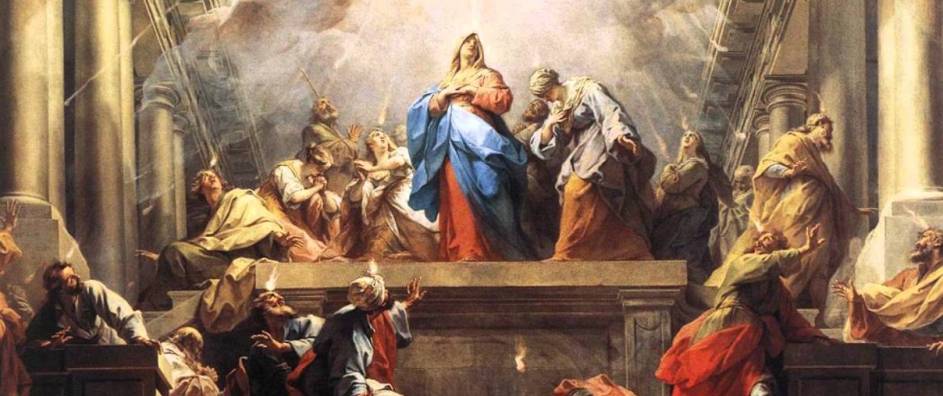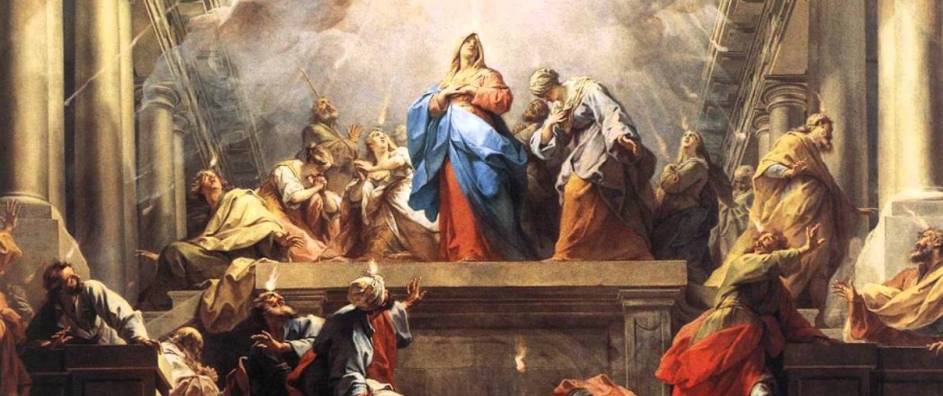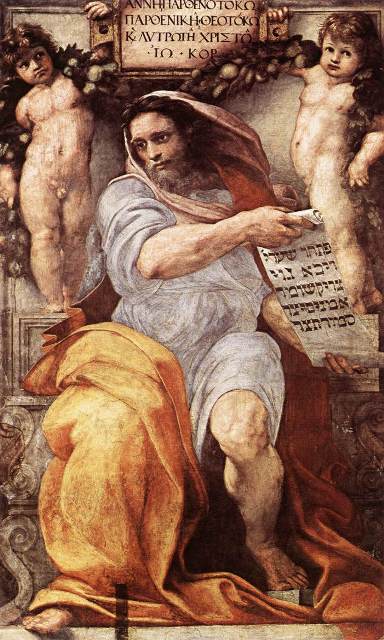The views expressed in our content reflect individual perspectives and do not represent the authoritative views of the Baha'i Faith.
 [Editor’s Note: This is the fourth installment of a multi-part essay called “Questions from a Clergyman”. Click here to read from the beginning.]
[Editor’s Note: This is the fourth installment of a multi-part essay called “Questions from a Clergyman”. Click here to read from the beginning.]
“Most Christians believe the prophecy of the coming of the Spirit of Truth fulfilled at , when the Holy Spirit was poured out upon the disciples causing even those of different lands to understand their words. Why don’t Baha’is believe this event fulfilled that prophecy?”
This question arose during a series of Cult Nights held by a local pastor (Dan) in my home town. Because I had pondered it so deeply in my own spiritual search, I looked forward to answering this question and Christ’s prophecy regarding the Spirit of Truth.
I was raised with the same understanding Pastor Dan had — that the event in which the Holy Spirit enabled the disciples to teach people of different nations fulfilled Christ’s words about the coming Spirit of Truth. However, when I sat down to compare the two passages of Scripture, my view was challenged.
Here’s the text of Christ’s prophecy:
I still have many things to say to you, but you cannot bear them now. However, when He, the Spirit of truth, has come, He will guide you into all truth; for He will not speak on His own authority, but whatever He hears He will speak; and He will tell you things to come. He will glorify Me, for He will take of what is Mine and declare it to you. All things that the Father has are Mine. Therefore I said that He will take of Mine and declare it to you. – John 16:12-15.
To provide context, Christ (in John 16:7) identifies this Spirit of Truth as a Helper, Comforter or Counselor — a title also used in Isaiah 9:6:
For unto us a Child is born, unto us a Son is given; and the government will be upon His shoulder. And His name will be called Wonderful, Counselor, Mighty God, Everlasting Father, Prince of Peace.
Christian theologians explain this as a prophecy of Christ’s second coming, and point out that it refers to a Person, not a disembodied spirit. Christ, the “Counselor”, refers to the Spirit of Truth as “another Counselor”.
Christ prophesies this Spirit of Truth will fulfill certain tasks:
- Guide the believers to all truth
- Speak on God’s behalf
- Show them future events (prophesy)
- Glorify Christ
- Show Christ’s teachings to the believers, explaining those things He said they could not understand
Does the descent of the Holy Spirit at Pentecost match the above points? Let’s look at the text of the passage:
And suddenly there came a sound from heaven, as of a rushing mighty wind, and it filled the whole house where they were sitting. Then there appeared to them divided tongues, as of fire, and one sat upon each of them. And they were all filled with the Holy Spirit and began to speak with other tongues, as the Spirit gave them utterance. And there were dwelling in Jerusalem Jews, devout men, from every nation under heaven. And when this sound occurred, the multitude came together, and were confused, because everyone heard them speak in his own language. – Acts 2:2-6.
This describes none of the things that Christ says the Spirit of Truth will do, nor do the disciples relate it to Christ’s prophecy. There is no prophetic utterance, and no revelation of a fuller truth.
Also, if the Spirit of Truth is the Counselor referred to in Isaiah, then He will manifest in the second advent of Christ. Clearly, the manifestation of the Holy Ghost at Pentecost had nothing to do with governments, kingdoms, prophecy, or a further revelation of Christ’s teachings.
The Apostle Paul’s writings make it clear he did not feel the disciples had been granted any fuller measure of knowledge:
For we know in part and we prophesy in part. But when that which is perfect has come, then that which is in part will be done away. … For now we see in a mirror, dimly, but then face to face. – 1 Corinthians 13:9-12.
He says this long after the events of Pentecost. Clearly, Paul did not feel they had been shown all truth, or seen the things that were to come.
Consider how the teachings of Baha’u’llah, as conveyed by His son, Abdu’l-Baha, address the key points of Christ’s prophecy:
The century has dawned when the Spirit of Truth can reveal these verities to mankind, proclaim that very Word, establish the real foundations of Christianity and deliver the nations and peoples from the bondage of forms and imitations. The cause of discord, prejudice and animosity will be removed, the basis of love and amity be established. Therefore, all of you must strive with heart and soul in order that enmity may disappear entirely and that strife and hatred pass away absolutely from the midst of the human world. You must listen to the admonition of this Spirit of Truth. You must follow the example and footprints of Jesus Christ. Read the Gospels… Consider how kind Jesus Christ was, that even upon the cross He prayed for His oppressors. We must follow His example. – Promulgation of Universal Peace, p. 41.
Read the next article in the series: Sacrifice and Resurrection
Read the previous article in the series: End of the World?
You May Also Like
Comments


















('Abdu'l-Bahá, Some Answered Questions, p. 109)
“The Disciples of Christ taught His Faith with the language of the Kingdom. That language conformeth to all languages, for it consisteth of celestial meanings and divine mysteries. For the one who becometh conversant with that language the realities and secrets of creation stand unveiled before him. ... Divine truths are common to all languages. The Holy Spirit, therefore, taught the disciples the language of the Kingdom, and they thus were able to converse with the people of all nations. Whenever they spoke to those of other nations of the world, it was as if they conversed in their tongues.” (‘Abdu’l-Bahá, from a previously untranslated Tablet quoted in a letter from the Universal House of Justice, 1987 Sept 14, Resurrection of Christ)
The last phrase uses the words “as if”, which indicates that the Disciples where not actually, literally speaking in 14 or so different languages simultaneously, but rather that the miracle was in the “hearing” and not in the speaking as the Book of Acts says, “we do hear them speak in our tongues the wonderful works of God.” (Acts 2:7)
The first thing to be aware of is the fact that God has endued everyone with “spiritual ears.” “There are two kinds of voices. One is the physical voice and it is expressed by atmospheric vibrations, which affect the nerves of the ear; the other is the breath of the Merciful and this is a call, which is continually heard from the Supreme Concourse and cheereth the pure and holy souls. May it be beneficial to those who have heard the Call!” (‘Abdu’l-Bahá, Tablets of ‘Abdu’l-Bahá vol. 3, p. 611-612)
“. . . we must thank God that He has created for us both material blessings and spiritual bestowals . . . He has designed the outer ear to enjoy the melodies of sound and the inner hearing wherewith we may hear the voice of our creator.”(‘Abdu’l-Bahá, Bahá’í World Faith, p. 267)
When we “hear the voice of our creator” that voice is always in the language with which we compose our thoughts and this is typically
our native language. If our native tongue is English, we “hear” the voice of divine inspiration in English; if our native tongue is Spanish, we “hear” the voice of divine inspiration in Spanish; if our native tongue is Persian, do we not “hear” the voice of divine inspiration in Persian; if our native tongue is Navajo we “hear” the voice of divine inspiration in Navajo,etc. Thus it was that everyone in a crowd
composed of people who spoke more than fourteen different languages or dialects could each, simultaneously, “hear . . . the wonderful works of God” in his own language. What they were “hearing” was the voice of divine inspiration.
The last piece of the puzzle is to realize that the act of teaching the Word creates an especially potent environment for the descent of divine inspiration on the student, which is why Shoghi Effendi cautions us to never think that it is we who are doing the inspiring.
“ . . . Everyone must remember that it is the ‘Holy Spirit that quickens’ and therefore the teacher must become like a reed through which the Holy Spirit may reach the seeking soul.” (From a letter dated 30 May 1956 written on behalf of Shoghi Effendi to the Hands of the Cause in the United States)
“Do you think it is the teachers who make converts and change human hearts? No, surely not. They are only pure souls who take the first steps and then let the spirit of Bahá’u’lláh move and make use of them.” (Shoghi Effendi, Principles of Bahá’í Administration, p. 26)
Here is one more point to consider. We should not assume that all of the people in the crowd at Pentecost “heard” the same message, since not only does the Holy Spirit speak to us in our own tongue but it also speaks to us in accord with our capacity and need. After all, there was no post Pentecost debriefing in which the people in the crowd compared notes to see if they all "heard" the same exact message. All that we know is that they all "heard" an inspirational message in their own tongues. As it was then so it is today, when a crowd anywhere “hears” a talk given by an exceptionally “inspirational” speaker that each comes away with a little different perspective on what was said. Haven't we all, while listening to an inspirational speaker, experienced having a flood of thoughts fill our minds so much so that we are no longer hearing what the speaker is actually saying but are instead enwrapped within our own thoughts. This, of course, does not mean that every random thought that comes into our heads is inspiration from the Holy Spirit, but by what other means would such inspiration come if not by the spontaneous appearance of a new thought?
Needless to say the relationship between the mind and the spirit is still an unsolved mystery even as is question of what "thought" is in the first place.
Carl